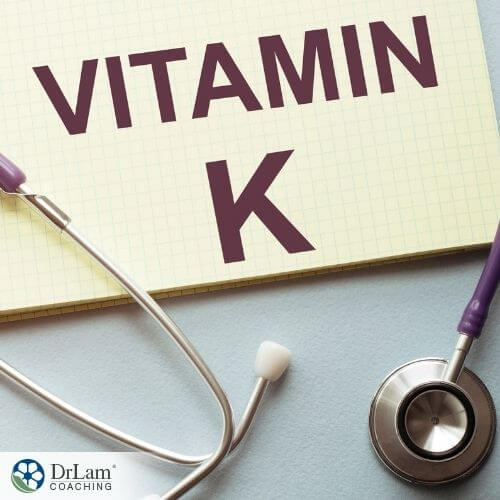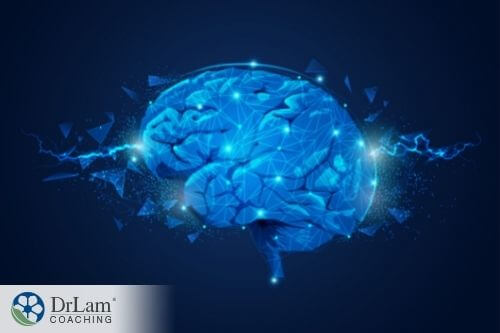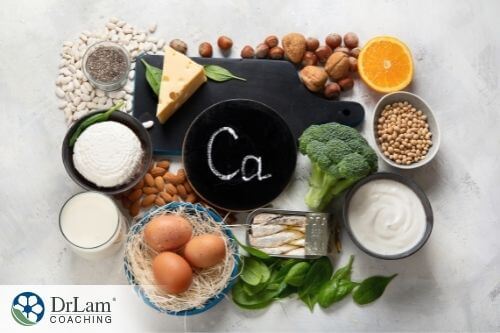 Vitamin K doesn’t get as much attention as many other vitamins, but it is still critical for your health. Vitamin K benefits are especially vital for women over 40 and newborn babies, but with its key role in calcium utilization, bone building, and blood clotting, it has benefits for us all.
Vitamin K doesn’t get as much attention as many other vitamins, but it is still critical for your health. Vitamin K benefits are especially vital for women over 40 and newborn babies, but with its key role in calcium utilization, bone building, and blood clotting, it has benefits for us all.
Vitamin K is a set of fat-soluble vitamins that play a major role in helping your blood clot. In addition, this vitamin works along with calcium to help you grow strong, healthy bones. And it helps regulate the levels of calcium in your blood. We discuss this later.
Your body uses vitamin K to produce prothrombin, a necessary protein and clotting factor important in helping blood clot and in bone metabolism. This is why, if you use blood thinners such a Warfarin or Coumadin, you need to consult your healthcare professional before starting vitamin K supplements.
Your body sometimes stores this fat-soluble vitamin in your liver and fatty tissues. Absorption of this vitamin is optimal when you consume it with some dietary fat.
However, your body can only store a small amount of vitamin K. And only small amounts of this vitamin circulate in your blood at any given time. For example, if you take a dose of vitamin K one time, your body will only use about 30-40% of it and rid itself of the rest.
There are two types of vitamin K.
First, vitamin K1, or phylloquinone, comes primarily from foods you eat, particularly cauliflower and green leafy vegetables like spinach, kale, and cabbage. Even though you typically won’t become deficient in this type of vitamin K because it occurs in so many foods, some research indicates people absorb only about 10% of what they ingest. This finding becomes particularly important if you suffer from a chronic health condition, such as digestive disordersor Adrenal Fatigue Syndrome (AFS), that affects your ability to absorb nutrients from the foods you eat.
Second, vitamin K2, or menaquinone, is typically produced by your gut. The bacteria in your gut can convert some vitamin K1 into K2. However, a number of factors influence the efficiency and extent of this conversion. Certain fermented soy foods contain moderate amounts of K2. In addition, some animal products also contain K2. Butter, egg yolks, beef liver, and curdled cheese contain the most. However, keep in mind the potential for other health problems that may come with ingesting large amounts of these animal products.
While deficiencies of vitamin K remain rare, they can happen. Without this vitamin, your body can’t produce prothrombin, leading to a greater risk of bleeding disorders and weaker bone structure.
Deficiencies typically affect newborns and those with malabsorption problems. Newborns typically get an injection of vitamin K to alleviate the possibility of a deficiency. For adults with problems with absorbing nutrients, supplements can help. However, there are risks if you take blood-thinning medication, so you should talk to your doctor first.
Vitamin K has a broad scope of benefits for your body. These are some of them:
 Research suggests but has not proven, that vitamin K helps maintain strong bone structure, increase bone density, and decrease the risk of fractures. In contrast, a lack of vitamin K can lead to increased risk of osteoporosis and bone fractures.
Research suggests but has not proven, that vitamin K helps maintain strong bone structure, increase bone density, and decrease the risk of fractures. In contrast, a lack of vitamin K can lead to increased risk of osteoporosis and bone fractures.
Both types of vitamin K appear to help regulate calcium balance, which aids in maintaining skeletal strength. Several studies involving vitamin K2 specifically indicate a significant reduction in spinal fractures, hip fractures, and all other fractures. When given to people with osteoporosis, K2 reduces bone mineral loss and the risk of fractures.
In part, these vitamin K benefits come from the ability of K2 to control how much osteocalcin is available in your body. Osteocalcin and calcium bind together to stimulate the bone remodeling process.
The vitamin K benefits for aging are especially significant for women to prevent osteoporosis. As women age, their estrogen levels decrease. This hormone plays a major role in bone density. Therefore, as estrogen levels decrease, the bone density also decreases because calcium becomes less available to increase it. As a result, the risk of bone fractures and hospitalization increases. Increased vitamin K2 could help offset the risk of fractures and improve bone density in this case.
Changes in your hormone balance play a key role in creating conditions of bone loss, and the changes that come with chronic stress are known to cause this kind of hormone imbalance. When your body comes under stress from any source, your adrenal glands begin producing more cortisol to fight the effects of stress.
Cortisol develops from pregnenolone, from which also comes the building blocks of other hormones, such as progesterone. Under conditions of high stress, the demand for cortisol outweighs the demand for other hormones. As a result, the levels of progesterone -which is a key hormone for balancing estrogen - decrease. Progesterone is another key hormone for bone building, so low levels of this hormone can further lead to osteoporosis.
With increasing stress, your adrenals become overwhelmed and can’t produce sufficient cortisol. This is a condition known as Adrenal Fatigue Syndrome, or AFS. This leads to a greater imbalance in hormones that can seriously affect calcium absorption.
Another perspective on this imbalance comes from the NeuroEndoMetabolic (NEM) stress response, a system composed of six circuits, consisting of three organs or systems each, which work together to help your body cope with stress. The Hormone circuit - consisting of the adrenals, thyroid, and ovaries or testes - regulates levels of cortisol, estrogen, and progesterone, along with other hormones. When this circuit becomes dysregulated, imbalances among other hormones increase, leading to a greater risk of loss of bone density. In addition to these imbalances, this dysregulation also affects calcium levels in your body.
Some research seems to indicate an association between increased episodic memory in older adults and increased levels of vitamin K in the blood. A study showed adults over 70 with good health and higher levels of K1 in their blood also experienced better episodic memory.
 Vitamin K also benefits brain function. It appears that K2 plays a role in protecting your brain as you age. This protective function involves the production of sphingolipids. Highly concentrated in your brain, changes in the metabolism of these compounds may affect the development of conditions like Alzheimer’s. In addition, other recent research indicates vitamin K2 may contain protective properties that decrease oxidative stress and inflammation, aiding psychomotor behavior and brain function.
Vitamin K also benefits brain function. It appears that K2 plays a role in protecting your brain as you age. This protective function involves the production of sphingolipids. Highly concentrated in your brain, changes in the metabolism of these compounds may affect the development of conditions like Alzheimer’s. In addition, other recent research indicates vitamin K2 may contain protective properties that decrease oxidative stress and inflammation, aiding psychomotor behavior and brain function.
One of the major vitamin K benefits involves reducing the risk of mineralization in your arteries. As you age, mineralization occurs naturally. As a result, your risk for heart disease increases. Increased levels of K2 in your blood significantly decrease the risk of mineralization, thereby reducing the risk of heart disease and stroke.
This benefit may be the best-known role of vitamin K for your health. Without both types of vitamin K, you would run the risk of excessive bleeding from any cut. Vitamin K manages the proteins utilized in blood clotting.
Some studies suggest K2 may decrease the return of liver cancer and increase survival rates. In addition, another study showed the risk of prostate cancer decreases in men with a high intake of K2.
You can get vitamin K from many different foods.
High levels of K1 occur in leafy green vegetables like kale and Swiss chard. Vegetable oils and some fruits also contain K1.
Some of the best sources of vitamin K1 include:
K2 sources include dairy products, eggs, meat products, and Japanese ‘natto’ that comes from fermented soybeans.
Natto, a Japanese breakfast dish, is the highest plant-based source of K2. It consists of soybeans fermented with natto bacillus and can be found frozen at certain asian food markets. For most Westerners, it is an acquired taste.
Some of the best foods containing vitamin K2 include:
However, eating a lot of these animal products may lead to other health issues including obesity, type 2 diabetes, cancer, and heart disease. Thus, it's still best to eat these in moderation.
If you eat a good amount of vegetables, you likely get enough vitamin K1. Its presence in so many vegetables makes it easier to ingest enough.
However, the same doesn’t hold true for vitamin K2. Some people can convert K1 into K2 in the gut, but not everyone. And because the best sources for K2 are either fermented soy products or animal products, not everyone can get sufficient amounts by eating their normal diet. Therefore, K2 supplementation may prove necessary.
However, if you take anticoagulant medicines, you should strive to get your K2 from foods. A sudden increase in K2 levels from supplements may significantly affect your anticoagulant medications. If you are on these medications, don't start K2 supplements before consult your healthcare professional.
 Vitamin D works along with vitamin K to regulate calcium metabolism for heart and bone health. Research indicates that vitamin K2 increases the absorption of vitamin D. K2 helps assure that calcium in your body is used for strengthening your bones. Its action in stimulating osteocalcin makes this possible.
Vitamin D works along with vitamin K to regulate calcium metabolism for heart and bone health. Research indicates that vitamin K2 increases the absorption of vitamin D. K2 helps assure that calcium in your body is used for strengthening your bones. Its action in stimulating osteocalcin makes this possible.
While no upper limit of tolerance for vitamin K has been discovered by researchers, toxicity can occur with any supplement.
Vitamin K can also interact with several types of medications. These include:
It is critical to talk to your healthcare professional before starting vitamin K supplements if you take any of these medications.
This type of vitamin is not as well-publicized as some others. However, vitamin K benefits can play a critical role in your health, especially in reducing osteoporosis and improving blood clotting and calcium absorption.
If you are suffering from a low level of vitamin K, here are a few things you can do to alleviate the situation. You can increase your intake of vegetables and other foods containing vitamin K, and consider taking vitamin K supplements if needed.
However, please be sure to consult your healthcare professional, particularly if you take anti-coagulants or any of the other medication listed above, or you suffer from AFS and are prone to paradoxical reactions.
If you would like to know more about or need assistance with low vitamin K levels, the team at Dr. Lam Coaching can help. We offer a free** no-obligation phone consultation at +1-626-571-1234 where we will privately discuss your symptoms and various options. You can also send us a question through our Ask The Doctor system by clicking here.
Vitamin K benefits affect those who suffer from any of several chronic conditions, including AFS. These benefits are especially helpful for those with hormone imbalance, heart problems, and poor blood clotting. Some of the benefits include increased bone density and protecting brain function.
